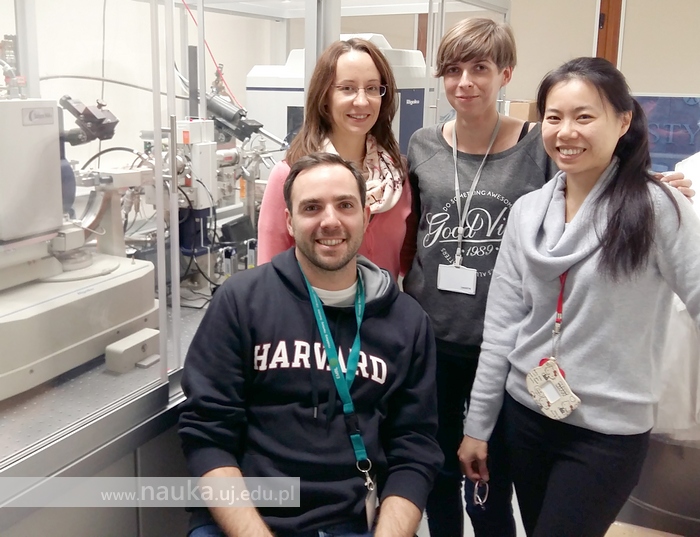
On Tuesday, December 8th, the European Molecular Biology Organization announced the laureates of the 2015 Installation Grants. Among only nine European scientists that received this distinction there is the Max Planck Research Group Leader, Dr Sebastian Glatt, from the Małopolska Centre of Biotechnology (MCB). His current research is focused on determining the role of different modifications of tRNA introduced by the Elongator Complex. Better understanding of its role may lead to new treatments for several neurodegenerative diseases and cancer.
Dr Glatt studied in his hometown of Vienna, Austria, and spent the last eight years studying tRNA modifications at the European Molecular Biology Laboratory in Heidelberg, Germany. Last September, he was appointed a Max Planck Research Group Leader at the JU MCB, where he assembled an international team of scientists to continue the research. "We're not trying to put Kraków on the world's scientific map. It's already there. What we're trying to do is to transform it into an important scientific hub", says Dr Glatt. "We can achieve this by promoting scientific excellence." This excellence comes not only from clever ideas but also proper organisation and efficiency. According to the EMBO IG laureate it can be achieved only by starting to work on problems in the fields that scientific community is actually interested in. "If you just try to find a scientific niche, nobody cares about, nobody is also interested in your work. If you, however, start working on things that everybody is interested in, you also have to be a little bit faster. Otherwise, others will publish first."
 Dr Glatt's research, focused on understanding the structure and function of the Elongator Complex in regulating the production of proteins in cells, is certainly in the centre of scientific interest. The Elongator Complex participates in the process of translation, i.e. the production of proteins in accordance with the genetic code, that occurs in every eukaryotic cell. Every cell of an organism has basically the same DNA, but different kinds of cells produces different proteins that it needs at a given moment. "This process is regulated in many different ways. One of them is based on tRNA (or transfer RNA), a molecule that captures amino-acids in cytoplasm and helps ribosomes to produce proteins", explains Dr Glatt. "We're interested in small chemical modifications in a part of tRNA called the anticodon." Anticodons are made up of three nucleotides that match three bases of the codon on the mRNA, a RNA strain that is a cellular blueprint for making proteins. These three bases can be modified and these modifications affect the process of protein making. "We know of almost 170 modifications in all kingdoms of life. We know which molecules make these modifications, but we know almost nothing about their function or how they affect the process of protein making", continues the Max Planck Research Group leader. "We know, for example, that if there is no modification, it takes longer to produce a protein and in effect it folds improperly."
Dr Glatt's research, focused on understanding the structure and function of the Elongator Complex in regulating the production of proteins in cells, is certainly in the centre of scientific interest. The Elongator Complex participates in the process of translation, i.e. the production of proteins in accordance with the genetic code, that occurs in every eukaryotic cell. Every cell of an organism has basically the same DNA, but different kinds of cells produces different proteins that it needs at a given moment. "This process is regulated in many different ways. One of them is based on tRNA (or transfer RNA), a molecule that captures amino-acids in cytoplasm and helps ribosomes to produce proteins", explains Dr Glatt. "We're interested in small chemical modifications in a part of tRNA called the anticodon." Anticodons are made up of three nucleotides that match three bases of the codon on the mRNA, a RNA strain that is a cellular blueprint for making proteins. These three bases can be modified and these modifications affect the process of protein making. "We know of almost 170 modifications in all kingdoms of life. We know which molecules make these modifications, but we know almost nothing about their function or how they affect the process of protein making", continues the Max Planck Research Group leader. "We know, for example, that if there is no modification, it takes longer to produce a protein and in effect it folds improperly."
The Elongator complex is composed of six proteins. Although the structures of some of the parts are already known, Dr Glatt intends to complete this very complicated three dimensional puzzle in Kraków.
"It's fascinating but what drives me is not only curiosity. I see my/our research in a bigger picture", says Dr Glatt. "We know that improper functioning of the Elongator is connected somehow with several neurodegenerative diseases like ALS or childhood epilepsy and cancer. In addition, it seems that there's also a connection between mutations in Elongator and intellectual abilities." It is therefore possible that the research of Dr Glatt's group conducted in Kraków will lead to new treatments and in effect improve the quality of lives of many suffering people.





